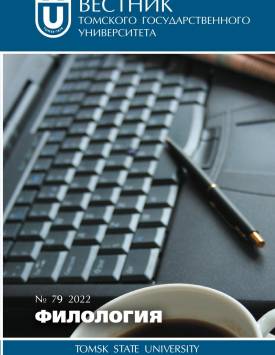The semantics of the nominal predicate with positional copula verbs (a contrastive aspect)
Positional copula verbs denote the location of an object or person; they remain little-studied in comparison with other semi-copulars. If included into the group of semi-copular verbs, they can be classified differently: as state-of-existence or aspect copulars, denoting the semantics of continuation, due to the original meaning of “stand”, “lie”, “sit” as full verbs. Their ability to be followed by a subject complement is limited, as a rule, to an adjective. The article presents the results of the semantic analysis of the structure “stand / lie /sit + past participle” as a regular aspect modification of beclause. The aim of the investigation is to specify and interpret the semantics of the abstract (surface) structure as passive or “quasi-passive” and to determine what participles can form the concerned type of the predicate. The research is performed on the basis of text-corpus data presented in the Russian National Corpus, along with the contrastive analysis applied to the results of preceding studies in English and German. The copulative function of the positional verbs can be proved by means of their substitution for the copula be. The semantic analysis, which includes the level of the thematic relations (participants of the situation) and the reference, brings to light the so-called “double” semantics of the semi-copulars: the abstract meaning of the true copula “be” (identifying the state) blends with their primary lexical meaning (position /location). The first actant is always a patient; the transformation method is used to differentiate between the passive construction and the “quasi-passive”, the latter having three varieties: (1) stative, or general state of existence; (2) subjective resultative denoting the state of the subject as a result of his/her own action; (3) the clause with an adjective as a complement. The reconstruction of the original active sentence helps to reveal the pivotal feature of passive semantics, namely the presence of the “hidden” referent (an agent or an effecter). The study focused on the analysis of structures with passive semantics, which is mainly influenced by the lexical meaning of the subject complement. Several semantic groups of the past participle tending to interact with positional copula verbs are established: those which are neutral specify the location of persons /things or show the result of a natural routine action; the others possess negative connotation denoting the physical or psychic impact on the object. The research displayed some occasions of semantic decline of positional semi-copulars which causes similarity between them and the copula “be” or aspect copulas of continuation (“remain”). Regardless of the extent of semantic decline, positional copula verbs proved to be an element of the alternation system of the basic be-form, including passive and “quasi-passive”. Certain peculiarities of the concerned type of the predicate, typical of Russian, on the one hand, and languages of the Germanic group, on the other hand, were taken into the consideration: the case form of the subject complement, the differences in the number of non-finite verb forms, specific occasional meanings, etc. Nevertheless, the contrastive analysis makes it obvious that the results obtained in Russian correspond on the whole to the conclusions made earlier with regard to English and German, which allows considering the functional and semantic characteristics of the structure “positional copula + past participle” as isomorphic. The author declares no conflicts of interests.
Keywords
positional copula verbs, subject complement, past participle, aspect modification, “double” semantics, passive construction, stative, subjective resultative, text corpus, method of transformation, contrastive analysisAuthors
| Name | Organization | |
| Nekrasova Irina M. | Perm State Humanitarian Pedagogical University | nekrasoval42008@yandex.ru |
References

The semantics of the nominal predicate with positional copula verbs (a contrastive aspect) | Vestnik Tomskogo gosudarstvennogo universiteta. Filologiya – Tomsk State University Journal of Philology. 2022. № 79. DOI: 10.17223/19986645/79/5
